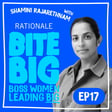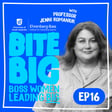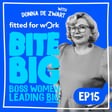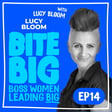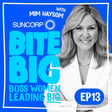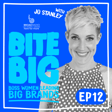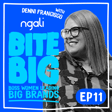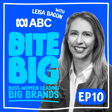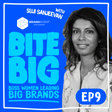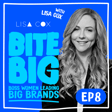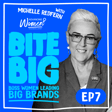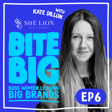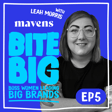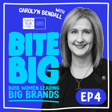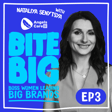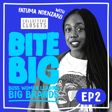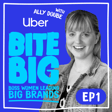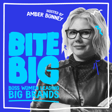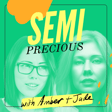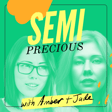
Amber Bites Big with Astrud Burgess, Group Chief Marketing Officer at ANZ bank
In Episode 18 of BITE BIG, I sat down with Astrud Burgess, Group Chief Marketing Officer at ANZ, to unpack the mindset, mantra and marketing savvy behind her powerhouse leadership.
Astrud’s journey from the retail floor to the C-suite is anything but typical. Starting as a graduate at ANZ, her path has spanned continents, industries, and disciplines, from media and telco in London to transforming customer experience, brand, and data strategy back home. Now, as Group CMO, Astrud is proving that creative instinct and commercial impact are not mutually exclusive.
Her mantra? “Optimise for joy.” A deceptively simple philosophy that drives how she leads, how she works, and how she stays sane in a high-pressure world.
👑 Boss Takeaways from Episode 18 with Astrud:
- “Optimise for joy.” It’s not about chasing happiness, it’s about choosing the work that energises you, builds momentum, and lets you play to your strengths.
- Embrace job kleptomania, mindfully. Astrud owns her love of saying yes to big opportunities, but with one caveat: it has to serve joy, not just busyness.
- Creative empathy is a leadership superpower. Whether leading data teams or developing brand platforms, Astrud blends logic with intuition and consistently backs her team with trust.
- Longevity in agency partnerships pays off. Her 12-year relationship with ANZ’s creative agency proves that trust, listening, and curiosity lead to bold, effective work.
- Brand is your trust engine. Especially in industries under public scrutiny, brand isn’t fluff, it’s foundational. And when done well, it lifts every other comms piece in market.
- Intuition = a personal data set. For a leader driven by evidence, Astrud still champions the value of gut instinct, because decades of experience is data, too.
- Help women take up space. From mentoring young marketers to advocating for financial literacy, Astrud is helping more women step up, take risks, and thrive.
🔗 Follow BITE BIG for more unfiltered stories from women who lead big—one mantra at a time.
Links:
Astrud LinkedIn
ANZ Website
ANZ Instagram
Orange Sky NZ
Amber's Instagram
Amber's LinkedIn
The Edison Agency's LinkedIn
The Edison Agency's Instagram
CREDITS
Host & ECD – Amber Bonney, The Edison Agency Founder
Producer – Niki Beeston, Group Account Director, The Edison Agency
Marketing – Liz Archer, Head of Operations, The Edison Agency
Social Assets – Alyssa Payad, Intern, The Edison Agency
Post Production – Francine Toscano, 17th Street Audio
